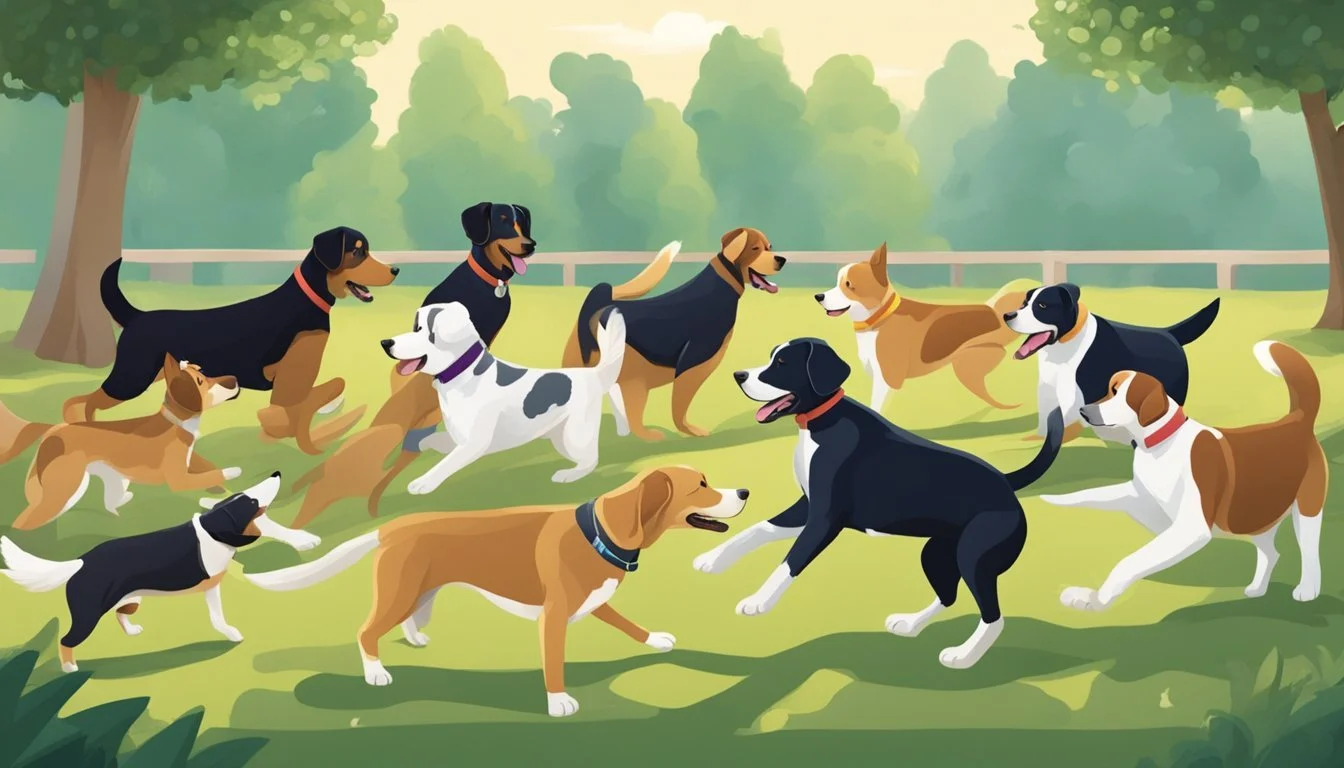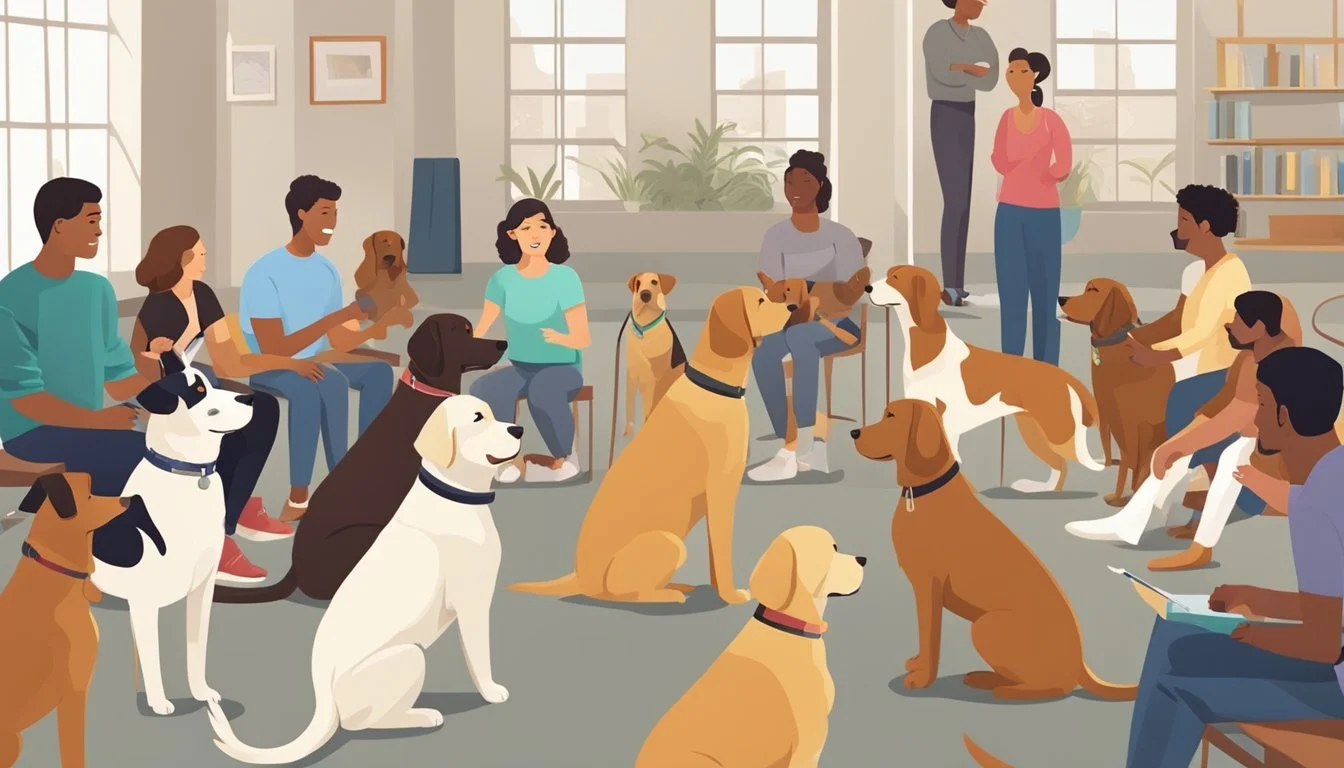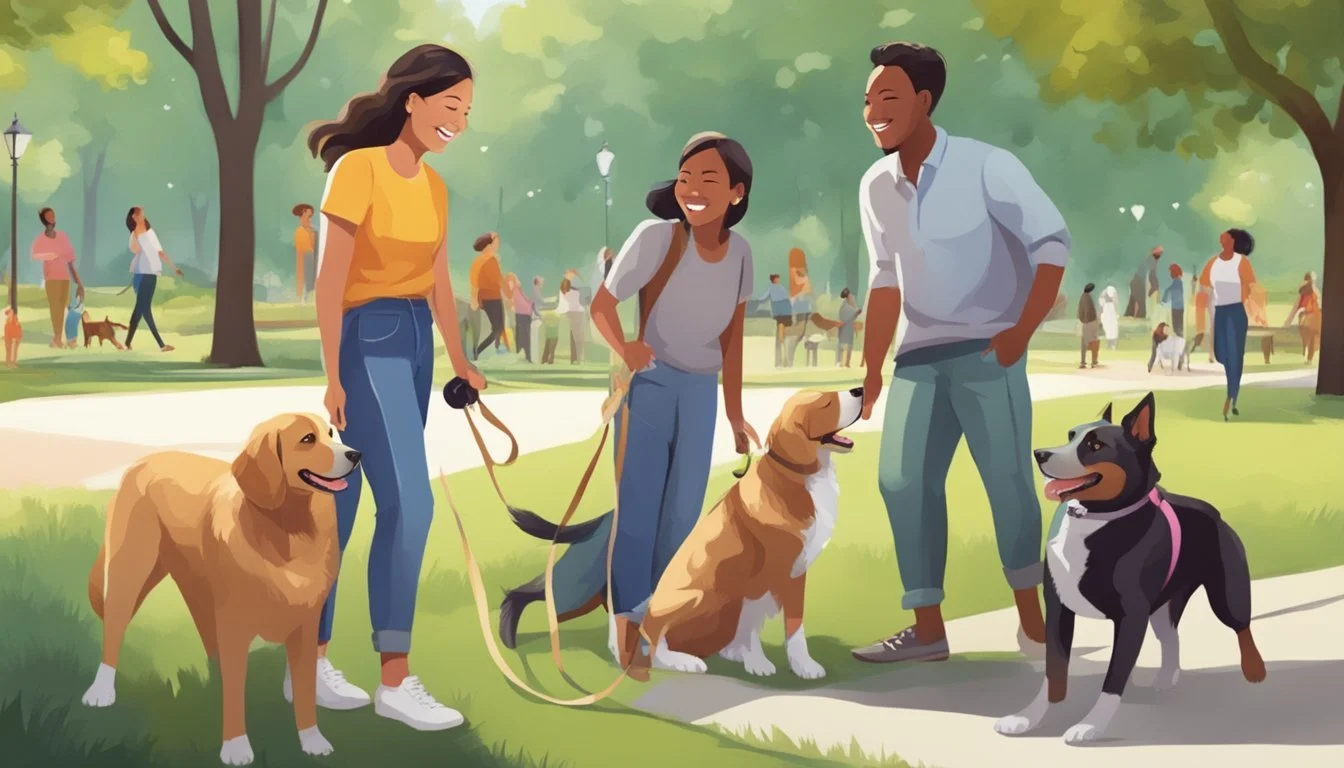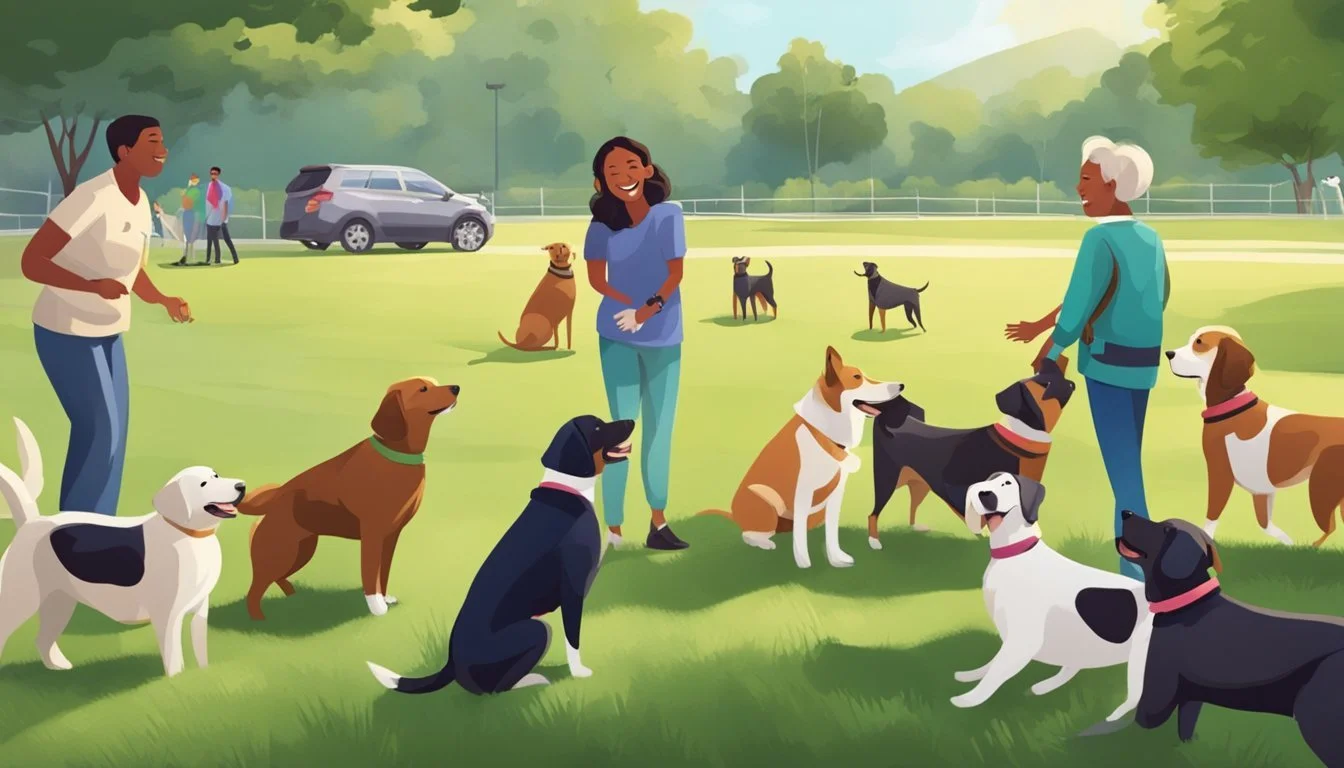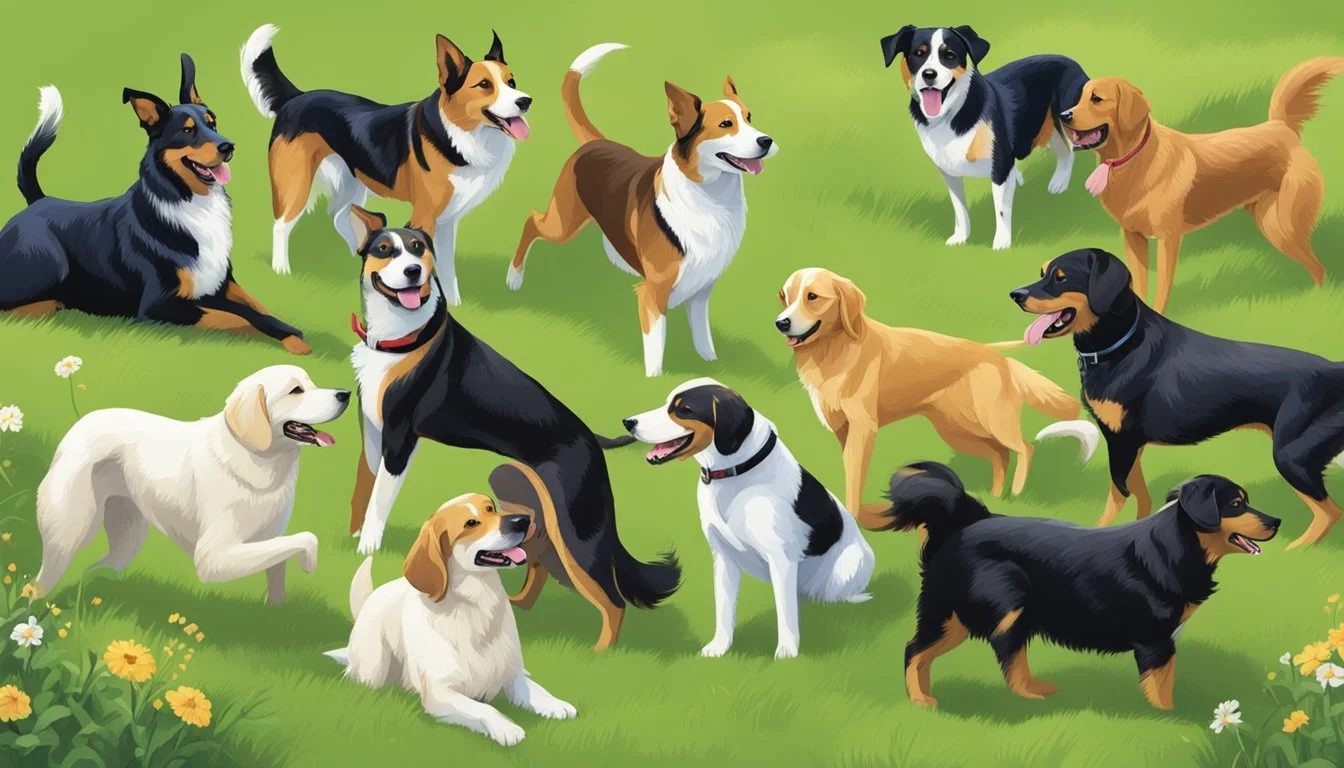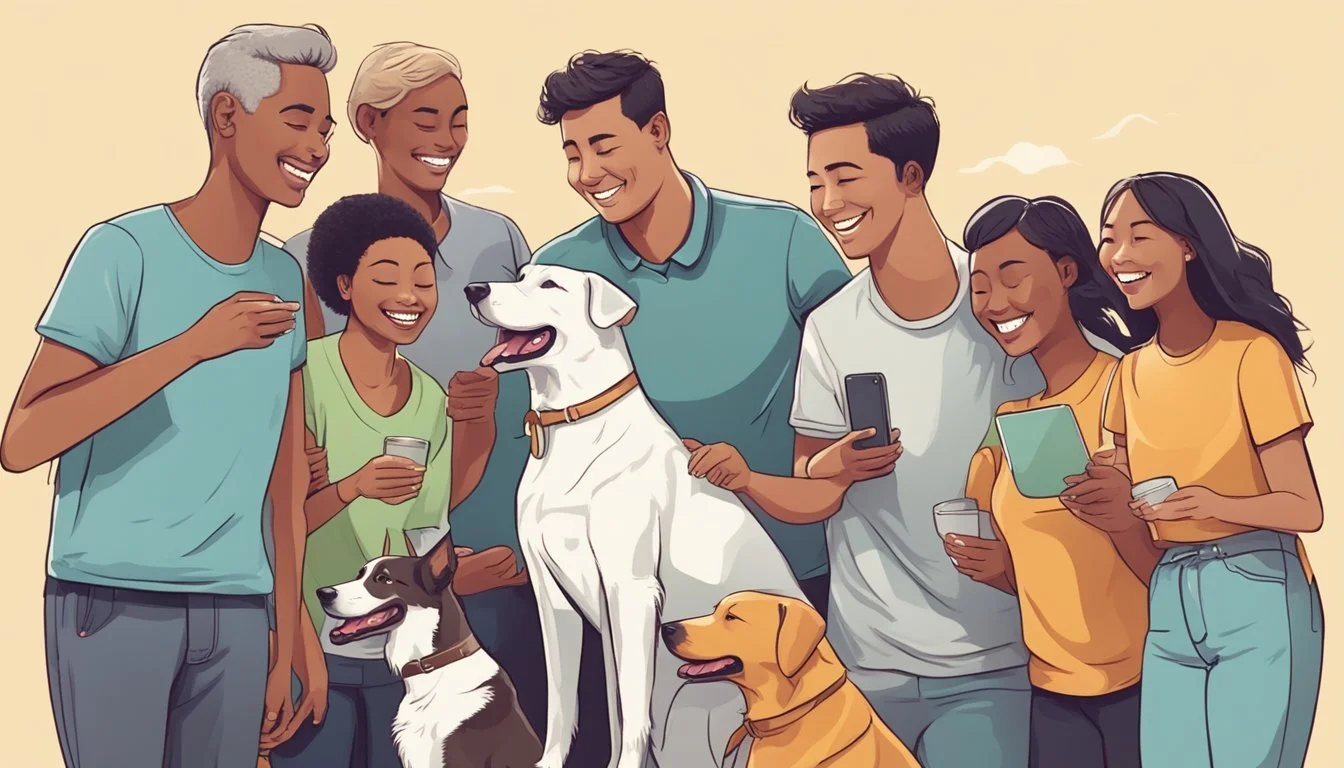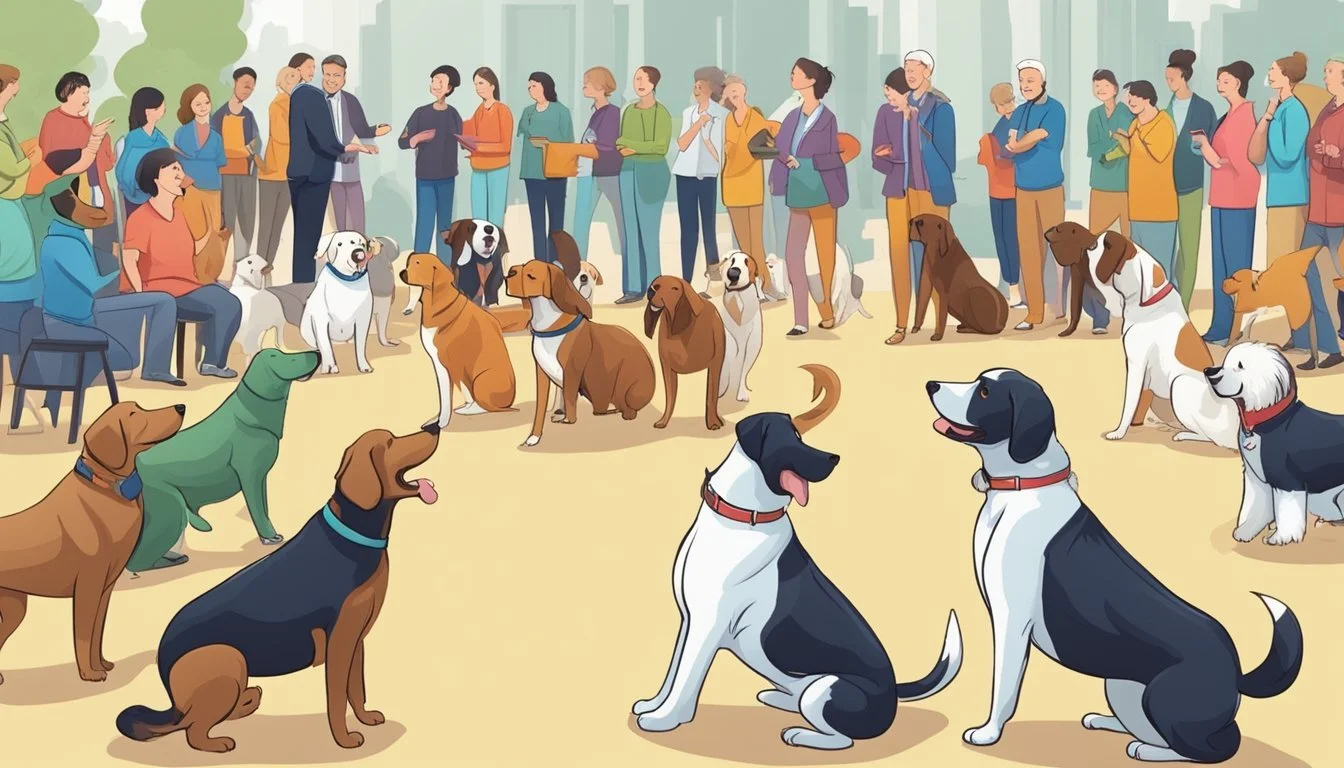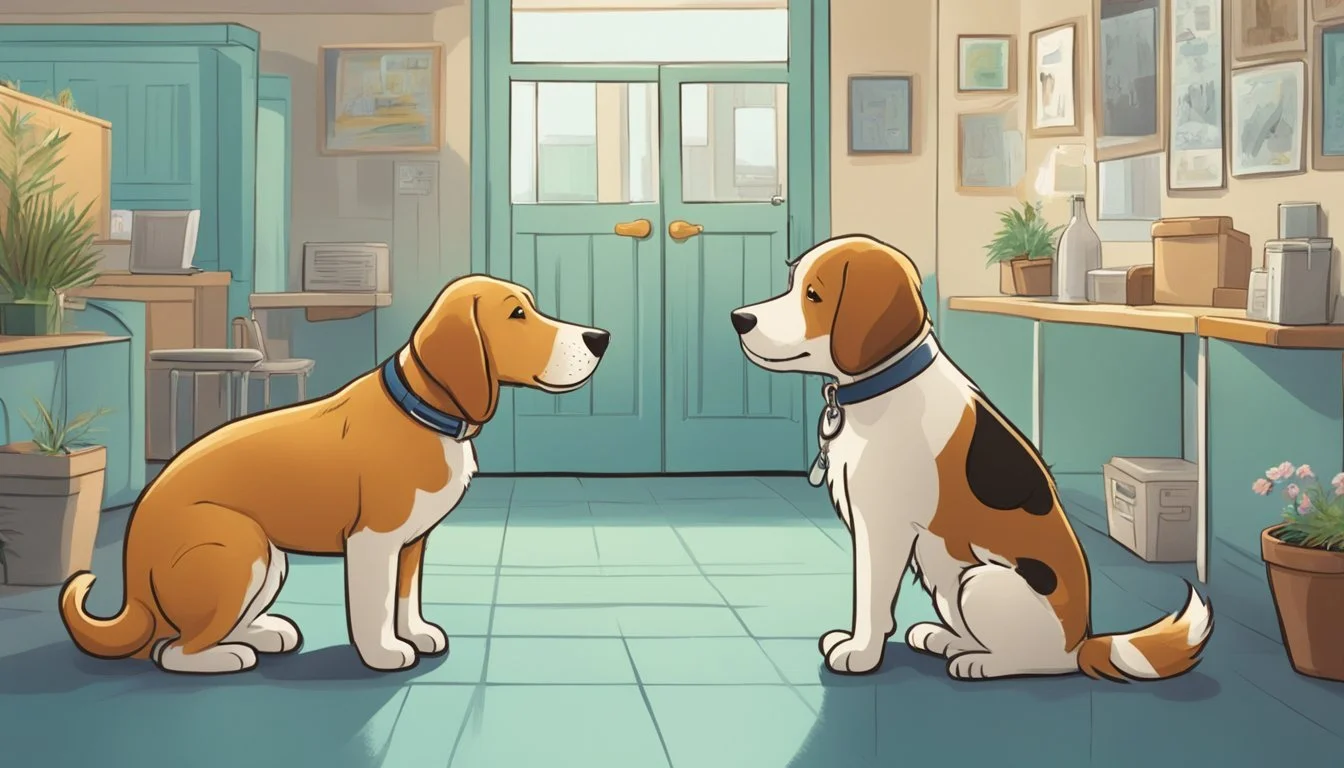14 Reasons Why Having a Dog Can Help You Make Friends
Building Connections with Ease
Dogs have been known to bring joy and companionship to their owners, but their benefits extend beyond the home. One significant benefit that many people might not consider is that having a dog can make it easier to establish new friendships. Whether it's through casual encounters on daily walks or participating in dog-related activities, dogs often serve as social catalysts.
Moreover, the positive interactions and shared experiences with fellow dog enthusiasts can lay the groundwork for lasting relationships. For those looking to expand their social circle, the presence of a dog can offer numerous opportunities to engage with others and foster meaningful connections.
1) Instant Icebreaker at Dog Parks
Walking into a dog park with a furry companion can turn a quiet day into an opportunity for social interaction. Dog parks are natural gathering places for pet owners, creating a shared environment where people feel more at ease.
Many find it easier to initiate conversations in such settings, thanks to the common interest in their pets. A simple compliment on a dog’s behavior or appearance can lead to a meaningful exchange. These interactions can pave the way for new friendships built on a mutual love for animals.
Additionally, dogs themselves often serve as the perfect introduction. Friendly canines may approach other pets or people, creating a natural space for their owners to engage in conversation. This spontaneity helps break down social barriers.
Dog parks also offer safe areas for dogs to play and socialize without causing disturbances in other public areas. Such settings facilitate more relaxed and open communication between people. For more insights, consider how dog parks benefit communities and pets.
Thus, dog parks become more than just recreational spaces. They transform into vibrant social hubs where new connections are fostered naturally and effortlessly.
2) Conversation Starter During Walks
Walking a dog is a natural way to initiate conversations with others. People often feel more comfortable approaching someone with a dog. This creates an easy, non-threatening opportunity to start a chat.
Dogs attract attention and can become a focal point in social interactions. Comments like "What a cute dog!" or "What breed is your dog?" can effortlessly lead to longer conversations.
In addition, regular walks can lead to meeting the same people repeatedly, fostering familiarity and adding depth to these interactions. Many friendships can begin simply by greeting fellow dog walkers in the neighborhood.
Dogs can also break down social barriers. Even people who might normally be shy or reserved can open up more easily when they have a friendly dog by their side. This can lead to increased social engagement and potentially new friendships.
Research indicates that having a dog can significantly boost one’s social life. The shared experience of dog ownership provides a common ground for starting conversations and building connections.
Walking in parks or around the neighborhood often results in spontaneous interactions. These interactions can lead to meaningful relationships over time. Friendly exchanges about pets often serve as icebreakers, paving the way for more in-depth discussions.
3) Join Local Dog Groups
Local dog groups offer a fantastic way for dog owners to meet new people and expand their social circles. These groups often organize various activities such as group walks, playdates, and training sessions, providing ample opportunities for interaction.
Joining a dog group gives both the dog and the owner a chance to socialize. Dogs get to play and interact with other dogs, which can greatly benefit their socialization skills. Owners, in turn, can bond over their shared love for dogs, making new friends in the process.
Many local dog groups can be found on social media platforms like Facebook. Simply use the search bar, enter your dog’s breed or location, and apply the relevant filters. This ensures you find groups that suit your specific needs.
By participating actively, members can enhance their social networks and even learn new things about dog care. Local dog clubs often involve their members in organizing events, which fosters a sense of community and camaraderie.
Moreover, being part of a dog group can be mentally stimulating for both dog and owner. It keeps the routine fresh by offering new experiences and challenges. This is particularly beneficial for single-dog households, providing much-needed interaction. Find out more about the many benefits of local and national dog clubs at the American Kennel Club.
Joining a local dog group is not only about socialization but also about forming lasting friendships and creating a supportive community centered around shared interests.
4) Attend Dog Training Classes Together
Dog training classes provide a structured environment for dogs and their owners to learn and interact. These classes are a perfect setting for both the dog and the owner to socialize. By attending, dog owners can meet others who share similar interests and values.
Group lessons allow dogs to interact and make new friends. This interaction is beneficial for their social skills. For owners, it's an opportunity to engage with like-minded dog lovers.
Dog training sessions often encourage collaboration and support among participants. This fosters a sense of community, making it easier to form connections. Owners can exchange tips and experiences, further strengthening their bonds.
Participating in these classes regularly can lead to lasting friendships. Consistent interaction helps build trust and familiarity among the attendees. This continuous engagement is key to developing deeper relationships.
Considering the benefits of organized training environments, it's clear that dog training classes are a great way to connect with others. They offer a unique platform for both socializing and learning, making them a valuable experience for anyone looking to expand their social circle.
5) Take Part in Dog-Friendly Events
Dog-friendly events are excellent social opportunities. Many communities organize events like dog shows, agility courses, and dog parades. These events allow dog owners to meet, share experiences, and form lasting friendships.
Local parks frequently host meetups for dog owners. These gatherings provide a relaxed environment where conversations flow naturally, aided by the playful interactions of the pets.
Charity walks and runs that include dogs bring together like-minded individuals who share a love for animals. Participants bond over a common cause, fostering community spirit and connections.
Dog training classes are another venue for socializing. Owners can discuss training techniques and behavioral tips, creating a supportive network.
Pet-friendly cafes and restaurants also offer spaces for casual meetups. Dog owners can enjoy a coffee while their pets socialize, providing a perfect backdrop for new friendships to develop.
Attending these events helps create a sense of camaraderie among dog lovers. It’s a shared interest that naturally breaks the ice, making it easier to initiate conversations and build relationships.
6) Shared Interests with Other Dog Owners
Dog owners often share a common enthusiasm for canine-related activities. Whether it’s discussing dog training techniques, favorite dog parks, or pet-friendly cafes, these shared interests can quickly spark conversations.
Attending dog-related events also provides opportunities for socializing. Events like dog shows, obedience classes, and agility competitions bring together people with similar passions, creating a natural environment for making friends.
Daily routines such as walking your dog in the neighborhood or visiting dog parks also foster connections. Regular interactions at these places can lead to friendships based on mutual interests and shared experiences.
Being part of a dog community can further expand social circles. Online forums and social media groups for dog enthusiasts offer platforms to exchange advice, share stories, and arrange meetups. These virtual interactions can often transition into real-world friendships.
Shared interests with other dog owners provide a strong foundation for building meaningful relationships. It's easy to bond over the joys and challenges of dog ownership, and these connections often lead to lasting friendships.
For more information on the health benefits of being a dog owner, visit American Kennel Club. Explore how dogs help reduce stress and loneliness according to Harvard Health.
7) Be a Regular at Pet Stores
Visiting pet stores frequently can create numerous opportunities to meet other dog owners. These stores often host events, such as grooming sessions or training workshops, where individuals with mutual interests gather.
Engage with store employees and other customers. Sharing advice and experiences about dog care can spark conversations and lead to friendships.
Many pet stores have loyalty programs or social events. Participating in these events helps build rapport with others who often visit the same store. This consistency in interactions can form the basis of new friendships.
Dog owners often seek recommendations for the best pet products. Offering or asking for advice on pet supplies can be an easy icebreaker, fostering connections.
Being a regular customer also means your dog gets familiar with the environment and people there. This familiarity can make your dog more social, encouraging interactions with other dogs and their owners.
By making pet store visits a routine, creating lasting bonds with other pet enthusiasts becomes simpler.
8) Volunteer at Animal Shelters
Volunteering at animal shelters is a fantastic way to meet like-minded individuals. Shelters often rely on volunteers for activities such as dog walking, cleaning, and administrative tasks. These activities provide ample opportunities to engage with other volunteers, fostering a sense of community and teamwork.
Dog walking is one of the primary tasks at shelters, giving volunteers a chance to bond over their shared love for animals. Walking dogs together encourages conversations and interactions with people who share similar passions.
Animal shelters also host special events and fundraisers, where volunteers collaborate to support the cause. Participating in these events can lead to meaningful connections and friendships as volunteers work towards common goals.
Moreover, spending time with animals has a natural way of breaking the ice between people. The presence of dogs and other animals often makes it easier for volunteers to strike up conversations and build rapport. Encountering others who are equally dedicated to animal welfare creates an immediate bond that can grow into lasting friendships.
Volunteering provides a sense of purpose and fulfillment, attracting compassionate and empathetic individuals. When people come together to care for animals, they often find that their interactions extend beyond the shelter, leading to strong social networks and friendships in their local communities. For more information, check out 10 Reasons to Volunteer at an Animal Shelter.
9) Engage in Outdoor Activities
Participating in outdoor activities with a dog opens numerous opportunities for social interaction. A trip to the park allows dog owners to meet others who share similar interests. Games such as frisbee, fetch, and tug of war foster camaraderie among pet owners.
Spending time at the beach is another excellent way to socialize. Dogs can play in the sand and water, while their owners engage in conversations with fellow dog lovers. This shared experience strengthens bonds.
Organized activities like group walks or dog yoga classes provide structured environments for meeting new people. These activities often create a sense of community and belonging, making it easier to form lasting friendships.
Outdoor activities can also reduce stress and promote relaxation for both humans and dogs. The fresh air and physical exercise benefit everyone involved. This relaxed atmosphere naturally encourages social engagement.
Participating in local dog-friendly events or joining dog clubs further increases opportunities to meet new people. These events often include activities specifically designed to facilitate interaction and connection among participants.
10) Host Dog Playdates
Hosting dog playdates can be a great way to form new friendships. Creating a mutual bond through shared experiences with pets fosters natural connections among dog owners. These gatherings provide a relaxed environment where both dogs and humans can socialize.
Dog playdates offer a platform for dogs to interact and expend energy in a controlled setting. By organizing these events, dog owners have the opportunity to meet fellow pet enthusiasts and exchange useful tips. Engaging in conversations about pet care can effortlessly lead to deeper connections.
To ensure a smooth gathering, make sure the play area is safe and comfortable. Consider adding elements such as a pool for cooling off or shaded spots for relaxation, as suggested in tips for dog playdates. Small precautions help create a positive experience for everyone involved.
Encourage regular hydration breaks by providing a communal water bowl. Ensuring dogs stay hydrated is crucial, and it can also serve as a bonding moment for the pets. According to BeChewy, this simple act can promote camaraderie among the dogs.
Introducing dogs to one another in a structured way during playdates helps them practice social behaviors. As bil-jac.com notes, some dogs are better suited for certain playdates. Owners should judge what socialization is best for their pets. By considering these factors, hosting dog playdates can be a rewarding activity that strengthens both human and canine friendships.
11) Be Approachable on Social Media Groups
Being approachable on social media groups dedicated to dog owners can significantly increase social interactions. Sharing experiences about your dog, posting pictures, and engaging with others' content can serve as icebreakers.
Responding to comments on your posts creates opportunities for conversations. Asking questions and seeking advice about dog-related topics can also encourage dialogue with other members.
Joining local dog-related groups, such as rescue organizations or breed-specific communities, allows for meeting people with similar interests. These connections can lead to friendships and real-life meetups through organized group events and activities.
Using social media to share positive and helpful content about dog care and training can also establish a friendly and approachable presence. Participating in discussions and providing support to other dog owners fosters a sense of community.
12) Enthusiastic about Pet-Friendly Cafes
Dog-friendly cafes offer a unique social environment for dog owners. These establishments provide a welcoming atmosphere for both pets and their owners. By accommodating dogs, these cafes help create opportunities for social interactions among dog lovers.
Pet-friendly cafes allow dog owners to meet like-minded individuals. They often serve special treats like pup cups, enhancing the experience for both pets and their owners. This shared interest in dogs can spark conversations and form new friendships.
These cafes also promote a sense of community. Regular visitors may become familiar faces, fostering a neighborhood vibe. Some cafes even host events that cater specifically to dog owners, further enhancing social bonding.
The setting of a cafe is generally relaxed and conducive to conversation. With laid-back music and a casual atmosphere, pet-friendly cafes provide the perfect backdrop for spontaneous interactions. Dog-friendly features make the space inviting and inclusive, encouraging frequent visits.
Frequenting pet-friendly cafes can lead to lasting connections. These regular meet-ups create consistent opportunities for dog owners to socialize. As a result, these cafes have become social hubs, especially popular among dog enthusiasts.
13) Participate in Dog Competitions
Participating in dog competitions offers excellent opportunities to meet like-minded individuals. These events attract dog owners who share a passion for canines and provide a friendly environment for socializing.
Dog competitions, such as agility trials or obedience contests, often involve group activities and communal support. Spectators and participants alike can engage in conversations about training techniques and breed specifics.
Engaging in these events helps build a network of fellow dog enthusiasts. By exchanging tips and experiences, participants can deepen their understanding of dog care and training.
These competitions provide a platform to showcase your dog's skills and talents. Observers may strike up conversations, leading to new friendships and connections.
Participating in events can also help dogs become more comfortable around new people and other animals. Socializing your dog in such settings creates more chances to bond with other dog owners.
Joining local or national dog competitions often involves collaboration and teamwork. Meeting new people and working together strengthens community bonds and enhances friendship opportunities.
Dog competitions also foster connections through shared experiences and mutual interests, making it easier to build lasting relationships. Being part of these events can open doors to a wider social circle.
14) Connect Over Vet Visits
Vet visits offer a unique opportunity for dog owners to connect with others who share similar experiences. Sitting in the waiting room, it's easy to strike up a conversation about your pets. Sharing stories about your dogs' health struggles or funny antics can help build rapport.
Talking to fellow pet owners during vet appointments can lead to deeper connections. You might find that you share more in common than just your love for dogs. This setting naturally encourages camaraderie as everyone shares the common goal of caring for their pets.
Veterinarians and staff can also be vital in building your network. Discussing your dog's health and seeking advice fosters a sense of community. These interactions can provide valuable insights and further opportunities to connect with other dog owners. For example, knowing how petting and talking to dogs during vet visits reduces stress can be a helpful tip to share with new friends.
Social Benefits of Owning a Dog
Owning a dog can significantly boost your social life. Dog owners often find themselves engaging in more friendly interactions and participating in community activities centered around dogs.
Increased Casual Interactions
Dogs naturally encourage casual interactions. A person walking their dog is more likely to be approached by others, striking up conversations that may not happen otherwise. These exchanges can range from simple greetings to in-depth discussions about their pets.
A dog provides a common ground for strangers to connect. Someone might stop to ask about the breed, age, or temperament of the dog, which can lead to further conversation. This can be beneficial for people who find it challenging to start conversations with others.
Dog parks also present opportunities for interaction. Owners gathered in these areas usually chat while their dogs play together. These settings facilitate repeated encounters, which can evolve into stronger social bonds over time.
Participation in Dog-Related Activities
Dog-related activities offer structured ways to meet new people. Training classes, for example, bring together dog owners with a shared interest in teaching their pets new skills. This creates a supportive environment where individuals can exchange tips and experiences.
Community events and competitions centered around dogs also foster social contact. There are numerous events like agility contests, dog shows, and group hikes that cater to dog enthusiasts. Participation in these events can lead to forming lasting friendships with like-minded individuals.
Volunteering with dog organizations is another excellent way to socialize. Activities such as organizing adoption events or dog therapy sessions can connect people through shared goals and passions. Individuals working together in these contexts often form meaningful connections.
Psychological Impact of Dog Ownership
Owning a dog can lead to significant psychological benefits, such as enhancing self-esteem and reducing social anxiety. These benefits foster a more positive mental state, encouraging dog owners to engage more openly and confidently with others.
Boost in Self-Esteem
Dog owners often experience a marked boost in self-esteem. The unconditional love and companionship provided by a dog can make an owner feel valued and important. Caring for a pet involves a sense of responsibility and accomplishment, both of which contribute to how individuals perceive themselves.
Studies indicate that interactions with dogs can release oxytocin, a hormone associated with bonding and positive feelings. This biochemical effect can enhance one’s sense of well-being and self-worth. Furthermore, daily routines, like walking and feeding a dog, provide structure and a sense of purpose, further contributing to an enhanced self-image.
In addition, owners frequently receive positive reinforcement from others. Compliments about how well-behaved or cute their dog is can further enhance their self-esteem. This external validation, combined with the intrinsic rewards of pet ownership, creates a powerful boost to one's confidence and self-worth.
Reduction of Social Anxiety
Dogs play a crucial role in reducing social anxiety. The presence of a dog can be a social icebreaker, making interactions with strangers more comfortable. People are naturally drawn to dogs, creating opportunities for social engagement that might otherwise be missed.
Petting a dog has been shown to reduce cortisol levels, which helps to alleviate stress. This physiological response creates a calmer demeanor, making it easier for individuals to engage in social situations. The regular social interactions that occur during dog walks also contribute to a sense of community and belonging.
Moreover, dogs offer a non-judgmental presence. Owners find comfort in the fact that their pets accept them without conditions, alleviating fears of being judged or rejected in human interactions. These experiences collectively help pet owners feel more at ease in social settings, reducing feelings of anxiety and enhancing their overall social confidence.

